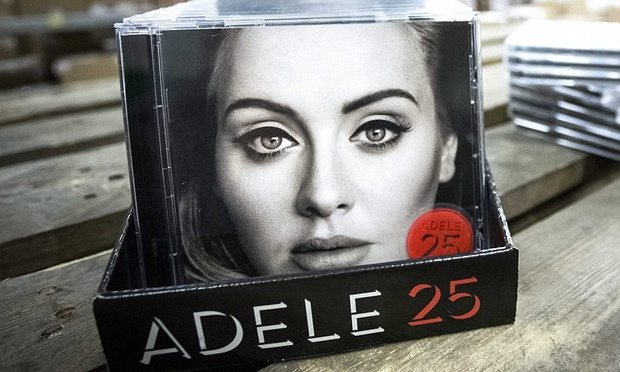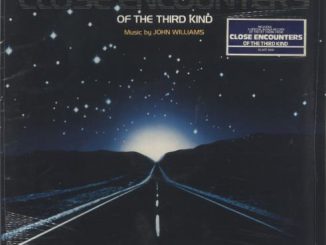
New release on course to break Oasis’s record for biggest one-week album sales despite overall decline in music industry

Adele is on course to break records for the biggest one-week album sales in UK chart history.
The album, 25, which shot to No 1 in the iTunes chart in 106 out of 119 countries, sold 300,000 copies in the UK alone when it was released on Friday, one of the biggest first-day totals of all time.
Only two albums have ever sold more than 500,000 copies in a week – Progress by Take That, which sold 518,601 in its debut week in November 2010, and Oasis’s Be Here Now, the all-time record holder which notched 695,761 in its first chart week in August 1997.
The success of 25 follows in the wake of that of the first album single, Hello, which went platinum and has become the UK’s fastest selling song of the year.
In isolation, these figures are impressive, but against the backdrop of massively declining album sales over the past five years, such predictions are unprecedented for an album released in 2015. Thanks in part to the rise of streaming, UK sales of digital albums fell by 9% and physical albums fell by 7% in 2014. Only one debut album this year, James Bay, has gone platinum. Last week, three critically acclaimed album releases by Grimes, Jamie Woon and Floating Points sold a combined total of just 7,000 albums.
The figures secure Adele’s place, along with Ed Sheeran and Sam Smith, among the 1% of artists who can reliably sell albums in big numbers, in contrast to the 99% lower down the charts whose sales are in freefall. While music industry experts argue that this “superstar artist economy” has always existed to some extent, the changing trends in music platforms and consumption have widened the gap more than ever. The top 1% of musical works now account for 77% of total artist revenues.
Yet the industry analyst Mark Mulligan said that the market was very different to fours years ago when Adele released 21, and predicted it would be a struggle to overtake it in terms of long-term album sales, particularly CDs.
Mulligan said: “The important thing that Adele did with 21 was she managed to get lots of fading music buyers back out of the woodwork and buying albums. But the odds of those people being dragged out of the woodwork again, four years later, are even less because they would have receded even further from music buying.”
Indeed, while Adele’s success lay in her wide demographic appeal, many of the shops where older generations might have previously bought her CD have gone out of business in the past four years – HMV, for example, has closed dozens of shops since 2011 and Fopp only has eight stores left in the UK.
Mulligan also stressed that while several people have claimed that 25 will be the record that “saves the music industry”, even if it is a blockbuster, it will be “swimming against the tide”.
“It will be atypical,” he said. “It’s not a reflection of where the industry is going, and just because we have one big successful album sale it doesn’t mean everybody’s going to start buying albums again. In the same way that Taylor Swift was a standout success last year, it didn’t stop music sales declining. The artists further down the tail are a truer reflection of where music sales are going.”
In a move that mirrors Swift’s actions last year, Adele has also chosen to not stream 25 on Spotify, at least for the time being. However, Keith Harris, chair of Music Tank, an industry thinktank and information hub, predicted that this would not be a permanent decision and that Adele was only creating a window to boost album sales.
With Adele’s broad demographic, Harris said that it was much less of a big deal for her to opt out of Spotify. Unlike Swift, whose predominately young fans are the biggest consumers of music through streaming services, many of Adele’s fans are from older generations who still purchase music both in physical and digital formats.
In a statement, Spotify said: “We love and respect Adele, as do her 24 million fans on Spotify. We hope that she will give those fans the opportunity to enjoy 25 on Spotify alongside 19 and 21 very soon.”
Industry analysts have also argued that album sales and streaming have become so biased towards the 1% of artists such as Adele because of the over-abundance of music now released. The democratisation of music, where anyone in a bedroom or any indie label can put music online and upload it on to streaming services – bypassing all music industry gatekeepers – has led to what Mulligan called an overabundance of “filler drivel”, which was too overwhelming to those seeking out music.
Harris added: “I think it’s because people are spoilt for choice. Thanks to the internet there’s too much noise from all kinds of artists and people don’t have the time to sift through it all. So you have a few artists who have the finance from their labels to make sure that they get noticed, and they get maximised, and everybody else is inevitably left in the long tail.”
It is a view echoed by Mulligan, citing “the amount of artist managers that I speak to who say their biggest challenge is cutting through the background noise”.
“People end up narrowing their vision rather than widening it because it feels too daunting to look for new stuff they actually want to hear. So people turn to most popular playlists and radio recommendations and flock to what they know and hear on the radio – artists like Adele.”
Harris also argued that people kept returning to the same popular artists such as Adele and Sam Smith because of an absence of trusted music gatekeepers to guide and influence people’s music tastes beyond a select few chart-topping artists.
“In the absence of, dare I say, really music obsessed tastemakers at places like Radio 1 and so on, the story has become more important than the music,” added Harris. “That’s not to denigrate Adele. I think her music is very good, but it now means people struggle to get their story and their music out there because people don’t really trust the tastemakers.”
Yet Andrew Dubber, professor of music industry innovation at Birmingham City University, said that it was an increasingly outdated perspective to focus on album sales at all, as they were no longer the main source of revenue for the music industry.
“The fact is, the broader music industry is not affected by outliers such as Adele,” said Dubber. “Both publishing, including getting music into films and adverts, and live concerts have overtaken recording as ways to make money from music, and I think recording is likely to become even less important as time goes on. So those top-line figures about how many artists sell records are increasingly not the best way to reflect the health of the music industry.”
Via the Guardian




Be the first to comment